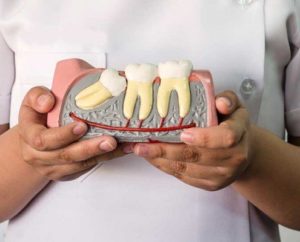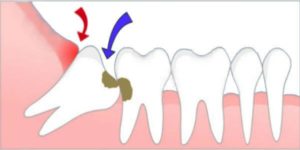

Wisdom teeth are the set of 4 molars (one in each quadrant) which erupt into the oral cavity around the age of 18-25 years. Having said that, it is also normal for them to erupt at a much later date.
However because of lack of adequate space, possibly as a result of evolutionary change, the wisdom teeth do not erupt in proper position and direction. They are either partially or totally impeded (impacted), or direct themselves towards the tooth in front or towards the cheek. Whatever be the case, they end up causing a lot of pain. They also attract a lot of food debris accumulation, resulting in gum infection as well as cavities in them and in the adjacent teeth.
Given such an unfavourable scenario, extraction of wisdom tooth becomes inevitable. Unfortunately many individuals defer the treatment for a very long time, which can result in severe infection and abscess, affecting not only that tooth, but also the adjacent tooth, bone and even the face.
Extraction of wisdom tooth, especially the lower ones is a surgical procedure, which would involve grinding a bit of the bone around the tooth. An oral and maxillofacial surgeon is very adept at such procedures and would carry it out as painless as possible. Mild swelling and discomfort can ensue following removal of the wisdom tooth. However your dentist would advise on appropriate medications, along with a certain diet restrictions, genuinely adhering to which would make your post extraction recovery very comfortable.
One of the most common doubts that arise in every patient’s mind is whether to undergo the surgical removal of wisdom tooth or defer it.
There are two schools of thought about removing / retaining the wisdom tooth. One group of dental fraternity strongly believe in prophylactically removing the wisdom tooth/teeth, even before any pain/trouble arises for the patient. Because it is believed (not proven) that eruption of wisdom tooth can result in crowding or malocclusion of the front teeth. This ambiguity is best sorted out by adhering to the guidelines laid out by NICE (National Institute for Health and Clinical Excellence), United Kingdom.
1. The practice of prophylactic removal of pathology (problem) free impacted third molars should be discontinued
2. Surgical removal is limited to patients with evidence of pathology, which includes decay in the wisdom tooth or adjacent tooth, gum disease around the wisdom tooth, infection around the tooth, fracture of tooth, any associated cyst/tumour, tooth impeding surgery or reconstructive jaw surgery and when the tooth is involved in or within the field of tumour resection.
Ghaeminia H et al., in their study have concluded that in case of retention of asymptomatic disease free wisdom teeth, clinical assessment at regular intervals to prevent undesirable outcomes in advisable.
Hence if a wisdom tooth is erupted in an unfavourable position, it has to be regularly monitored and when a potential problem arises, it should be extracted without further delay to avoid complications










I really like what you guys are up too. This kind of clever work and reporting!
Keep up the very good works guys I’ve included you guys to
blogroll.
Like!! Great article post.Really thank you! Really Cool.
thank you
thank you